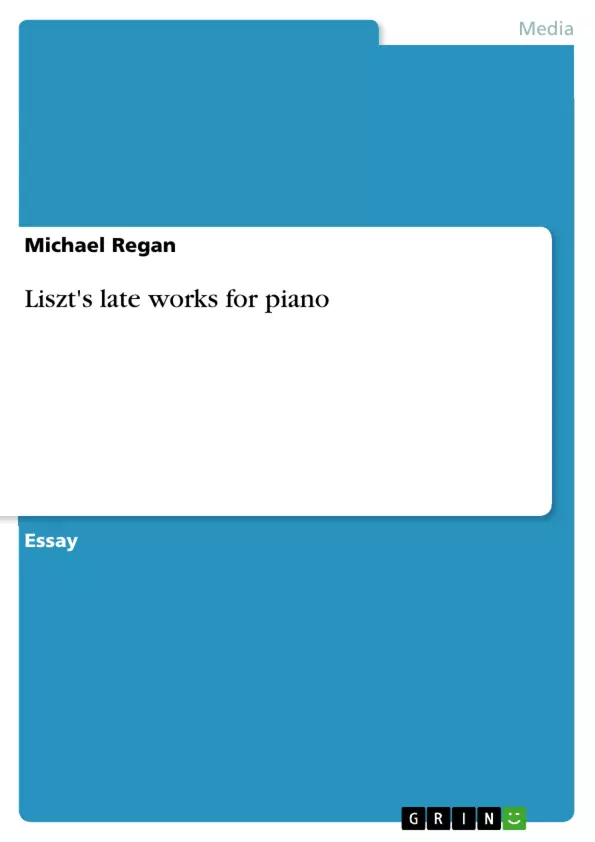Franz Liszt, remains an enigmatic figure. Probably no other major composer of the 19th century, with the possible exception of Berlioz, has aroused such contradictory opinions. That he was a major figure there can be no doubt- the B minor sonata and the Faust symphony testify to that. But that he was a genius, as Alfred Brendel, and, no doubt, others suggest, is more debatable. Geniuses produce works which (1), withstand the test of time, often of very long periods of time, and (2), are perceived as flawless masterpieces (or as near to it as is humanly possible). Now, although Liszt passes on the first point- his work is still very much with us both in live and recorded form- I do not think it can be said that any of Liszt’s works, even the very best, are flawless. Even the great B minor Sonata has at least two dud bars (708-9), and does not that great tune marked grandioso, and first heard in bar 105, come just a little too many times for the effect that Liszt was aiming at to be fully realised?
On the other hand he cannot be dismissed lightly. His enormous output contains many works, which may not be masterpieces but can still have an uncanny power over unprejudiced audiences. I remember Claudio Arrau’s magisterial readings of some of the Transcendental Studies which almost convinced one that these were indeed masterpieces, and Kempff’s poetic and almost impressionistic touch with some of the pieces from Anees de Pelerinage.
But whatever we may think about his final place in the pantheon of composers, there can hardly be any dispute over the position of the late works, those written after 1860 in which Liszt, virtually on his own, foreshadowed many of the new directions explored by composers in the 20th century. In mostly short pieces, and in the main for his own instrument, we find Liszt anticipating impressionism, atonality, unorthodox chords and progressions, and scales outside of the customary major and minor, all of which did not become common until well after 1910.
Inhaltsverzeichnis (Table of Contents)
- Liszt's Late Works for Piano
- Variations on a Theme of Bach “Weinen, Klagen, Sorgen, Zagen”
- Vier Kleine Klavierstucke
- Hungarian Works
- Csardas Macabre
- Csardas Obstine
- Nuages Gris
- Anees de Pelerinage- Italie
- Aux Cypres 1 and 2
- Les Jeux d'eaux
Zielsetzung und Themenschwerpunkte (Objectives and Key Themes)
This essay aims to explore the late works of Franz Liszt for piano, written after 1860, focusing on their experimental nature and their anticipation of 20th-century compositional trends. It explores the composer's stylistic evolution, the influence of personal tragedies, and the unique characteristics of his late works.
- Liszt's late works as a departure from earlier virtuosic style
- The influence of personal tragedies on Liszt's musical expression
- Anticipation of 20th-century musical trends in Liszt's late works
- Analysis of key compositional elements in Liszt's late works
- The relationship between form and content in Liszt's late piano music
Zusammenfassung der Kapitel (Chapter Summaries)
The essay begins by introducing Franz Liszt as a complex and enigmatic figure, whose late works challenge the traditional perception of his genius. It discusses his disillusionment with his earlier career and the impact of personal tragedies on his musical output. The essay then examines several of Liszt's late works, highlighting their experimental aspects and their anticipation of 20th-century musical techniques. It explores specific pieces, including the variations on a theme of Bach, the Vier Kleine Klavierstucke, the Csardas Macabre, and the Csardas Obstine, analyzing their unique features and compositional innovations. Finally, the essay focuses on Liszt's third volume of Anees de Pelerinage, highlighting the significance of the three tone-poems descriptive of the Villa d'Este and discussing the somber mood and harmonic schemes that characterize his elegiac late works.
Schlüsselwörter (Keywords)
The key terms and concepts explored in this essay include: Liszt's late works, experimental piano music, 20th-century musical trends, atonality, impressionism, unorthodox harmonies, tonal ambiguity, chromaticism, Hungarian folk music, Csardas, elegy, tone poems, musical form, and the influence of personal tragedy on artistic expression. The essay also delves into specific compositional elements like repeated motives, ostinati, augmented triads, and the use of parallel fifths.
Frequently Asked Questions
What is unique about Franz Liszt's late piano works?
Written after 1860, these works are characterized by experimental techniques such as atonality, impressionism, and unorthodox chord progressions that foreshadowed 20th-century music.
How did personal tragedies influence Liszt's late music?
Tragedies in Liszt's life led to a shift away from his earlier virtuosic style toward a more somber, elegiac, and tonally ambiguous musical expression.
Which specific pieces are analyzed in this essay?
The essay examines works like "Nuages Gris," "Csardas Macabre," "Vier Kleine Klavierstucke," and pieces from "Années de Pèlerinage – Italie."
Does the author consider Liszt a "flawless" genius?
The author debates this, suggesting that while Liszt's influence is undeniable, even his best works, like the B minor Sonata, contain moments that may not be perceived as "flawless."
What musical innovations are found in these late works?
Innovations include the use of augmented triads, parallel fifths, scales outside the major/minor system, and a departure from traditional musical forms.
- Citar trabajo
- Michael Regan (Autor), 2010, Liszt's late works for piano, Múnich, GRIN Verlag, https://www.grin.com/document/160789



